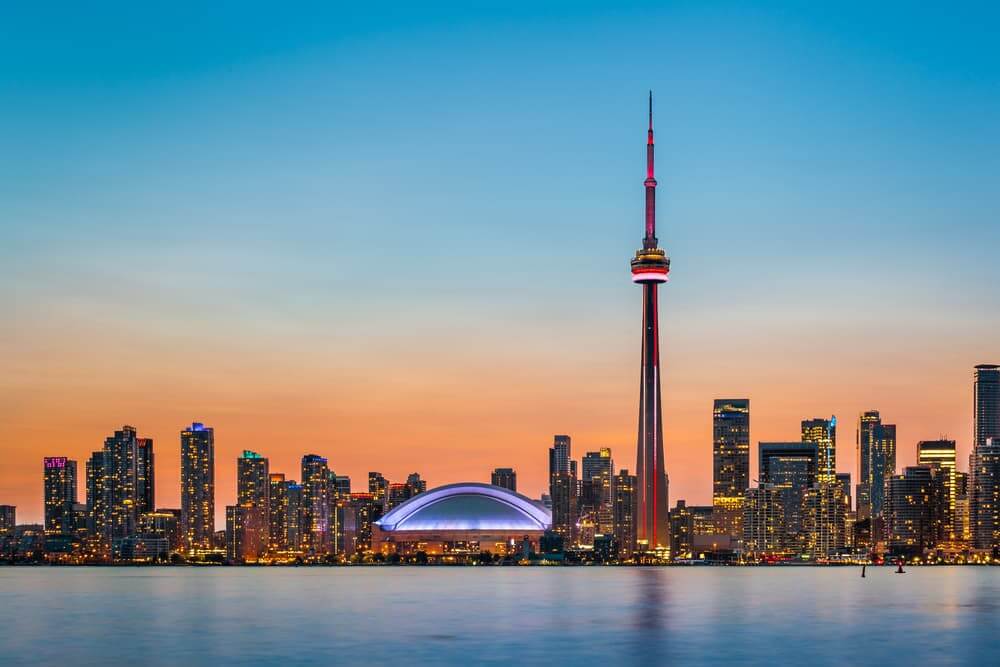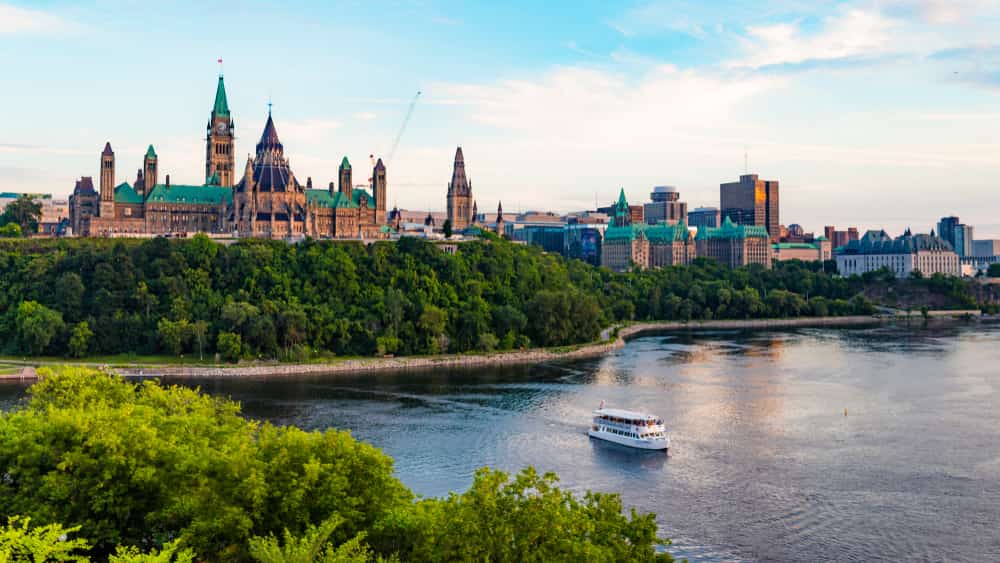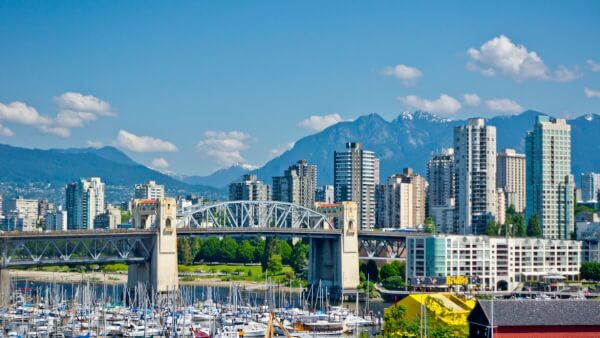Pros and cons of living in Canada vs the UK
Discover the pros and cons of living in Canada vs the UK in our handy guide, including tips on where to live in Canada and safety advice.

Can you retire to Canada from the UK? If you’ve been wondering about whether it’s possible, we’re here to take you through the practicalities of relocating there.
In this handy guide, we’ll look at some of the biggest benefits of life in Canada, as well as some of the most attractive retirement communities in the country. Plus, we’ll cover what to consider before you make the decision including what visas might be available to you as a UK citizen or resident, and the steps you can take to make your retirement plans a reality.
As you’re interested in relocating overseas, we'll also show you how to save money on the associated costs with Wise.
If you open a Wise multi-currency account, you’ll be able to send money overseas and receive money for very small fees1. What’s more, you can also get a Wise debit card to make payments at the mid-market exchange rate¹. We’ll tell you more about this after our guide to retiring in Canada.
Learn more about
Wise multi-currency account 🌎
Learn more about
Wise international debit card 💳
Canada is an exciting place and has a lot to offer UK retirees, not only as somewhere to visit but also as a place to call home. Some of the benefits to life in Canada are:
The high standard of living. Canada’s great healthcare facilities, transport networks and housing make the country a very desirable place to live. The cost of living in Canada does vary from place to place, with some of the most desirable locations a bit on the pricey side. But in general, Canada is affordable when compared with many developed countries2.
Ease of transition. One of the two main spoken languages is English, making for an easier transition for UK citizens and residents.
It’s multicultural. Plus, Canadians are known for being polite and welcoming to foreigners.
It’s safe. The country has low crime rates, strict gun laws, a track record of peacekeeping and a tolerant foreign policy.
It’s a vast country with amazing natural wonders. This includes tundra, forests and the Rocky Mountains, so there’s lots to see and explore.
There are some great places to retire in Canada. The Canadian online personal finance and lifestyle site, MoneySense, came up with a list of top places to retire in Canada based on the sorts of things retirees may look for in a retirement community. For example, a thriving culture, low crime, accessibility, good healthcare, nice weather and more.
We’ve combined our recommendations with theirs to come up with the top 5 choices3:

The capital city of the province of British Columbia is a very popular retirement spot. The large community of over 65s enjoy the many activities the city has to offer. It has a mild climate and is located on the water, so it’s both sunny and scenic.

Ottawa is a multicultural city with a large immigrant population, and over 17,000 Brits have already made it home2. It has the benefits of a city (such as lots of events and attractions including theatres, museums and galleries) but with a more laid back, close-knit community feel to it.

Another city in Ontario coming high on the list is Orillia. This city has a large waterfront, making for a picturesque place to live. It also has an ‘arts district’ with many galleries and theatres. There are lots of well-established retirement communities here, as well as active seniors clubs.

Situated in British Columbia, Nelson is a city that offers a mild climate for Canada and a high quality of life. Surrounded by mountain scenery and with nearby Kootenay Lake, it’s a real beauty spot, with a strong sense of heritage.

Also in British Columbia is Saanich, a municipality on Vancouver Island. Mild winters and relaxing green spaces, combined with a beautiful coastline, has made this an attractive place for retirees. The neighbourhood layout provides ease of access to amenities and leisure activities, including shopping, tennis courts, bowling clubs and golf courses.
If Canada sounds like it might be for you, at this point you may be asking: can I immigrate to Canada if I am already retired?
Well, Canada focuses on encouraging people into the country who are most likely to contribute to the economy, so there isn’t a specific retirement visa or pathway to permanent residency for retirees to follow. This may make things more complicated, but there are still alternatives. We suggest you take a good look at them to see which might fit your plans or your individual circumstances.
To retire in Canada, you can look to see if you would be eligible to apply for a visa. We’ve listed some that may be applicable as follows:
Family sponsorship4 - Canada recognises the importance of connecting families, so if you have close family (spouses, parents, children or grandchildren) who are Canadian citizens or permanent residents and they are aged over 18, they may be able to apply to sponsor your visa. In some situations it may even be possible to get sponsorship from a non-immediate family member i.e. a sibling or uncle/aunt. Sponsors will need to be in a position to show they can support you financially for several years.
Parent/grandparent super visa5 - If you’re the parent or grandparent of a Canadian citizen or permanent resident, you and your spouse or common-law partner could be eligible for this visa. It allows you to stay in Canada for up to 2 years without needing to renew your status. It’s also a multiple entry visa so you can enter Canada multiple times over 10 years.
Work related programmes6 - Depending on your age and circumstances, you could potentially consider moving ahead of retirement and working. This could allow you, and your spouse and dependents, to gain permanent residency in Canada without the need for a retirement visa. To do this you could look at applying for the following skilled worker visas: Express Entry, Provincial Nominee Programs (PNP) or the Quebec Skilled Worker Program (if you want to move to Quebec). For self-employed people there’s also a Self-Employed Persons Programme.
Alternatively, if you can be flexible and it’s feasible to work a second home into your plans, you could look at living in Canada on a part-time basis by visiting Canada for up to 6 months a year.
UK citizens can live in Canada for up to 6 months in a 12 month period without a visa7. The really good news is, as long as you're exempt from the temporary Foreign Home Buyer Ban8, which has been extended until 2027, you don’t need a visa to buy property in Canada either7.
Check eligibility. If you plan to retire to Canada on a permanent basis, check you meet the eligibility criteria for the visa or programme you wish to apply for. You can check the full eligibility criteria for a range of visas and work related entry programmes here.
Apply for your visa or programme. Each option has a specific application process to follow. You can find all the information you’ll need to apply (including application forms and document checklists), as well as details on fees and application processing times on the Government of Canada website.
Organise your pension. You can choose to move your pension overseas into a recognised overseas pension scheme (ROPS) or you can have your pension provider pay the money into a UK bank account and then move the money overseas yourself9. You can also mix these options and have one UK pension and one in Canada. Let HMRC know if you’re planning to retire abroad so that you're taxed the right amount on your pension. You should note that the UK state pension is also payable in Canada but unfortunately you won’t be able to get the yearly increases9. If you’re eligible for the state pension you can claim it from Canada by contacting the International Pension Centre or filling out a claim form and posting it to the address on the form10.
Organise your health insurance. It’s recommended that UK retirees living in Canada take out health insurance, even though public healthcare in Canada is of a good standard. Taking out global health insurance will make sure you’re covered from first entering Canada and can help you avoid long waiting lists. Most Canadians have health insurance as additional cover.
Purchase or rent property. You may wish to purchase your own home in Canada. The price of property is generally affordable compared to many developed countries. It is worth noting the current legislation that restricts non-nationals from buying property, the 'Prohibition on the Purchase of Residential Property by Non-Canadians Act8’. This temporary ban is in place to help Canadian nationals buy property without being priced out of the market. However, there are several exceptions to the act11, including where you wish to buy, among other criteria. Be sure to check if you meet these requirements before you start searching for your dream retiree home. Renting is also an option, especially useful for those looking to buy once the ban ends. For example, in the popular retirement destination of Ottawa, rent prices are 47.2% lower than large cities in the UK, like London12.
So, that’s your step-by-step guide to retiring in Canada. As you’re looking to retire abroad we’re keen to show you how you can save on relocation costs with Wise.
There are real benefits to be had if you open a Wise multi-currency account, the easy, quick and secure way to send money internationally.
With Wise, there are only low fees to pay and you see all charges upfront, meaning you won’t get caught out by expensive hidden bank charges¹. Even better, you’ll get the mid-market exchange rate, with no mark-up added on top, just a small fee¹.
This could be a really useful way to save money when sending or receiving payments between the UK and Canada. For example, your pension funds, or costs associated with a property purchase for example.
With the multi-currency account, you can also get a Wise debit card and spend in Canadian dollars from the moment you arrive in Canada. You’ll spend at the mid-market exchange rate, with only a small conversion fee¹.
While using a Wise account is different from using a bank account, Wise is just as committed to keeping your money safe and your account secure. There are sophisticated security measures in place, including a dedicated fraud team and two-factor authentication. So, you can feel confident in the knowledge that your money is in safe hands.
Now that we’ve looked at how to go about retiring in Canada, we hope you’ll have an idea if it might be right for you.
Finding the right community is important, so spend time looking at locations that appeal to you and visit a few of them first if you can, so you can get a sense of what life is like there.
Decide if you’ll permanently relocate or if you’ll travel between Canada and the UK for extended periods. And if you’re wanting to move permanently, you’ll need to apply for a visa on one of the immigration programmes.
Good luck and enjoy your retirement in Canada!
Sources used for this article:
Sources checked and updated on 14-February-2024.
*Please see terms of use and product availability for your region or visit Wise fees and pricing for the most up to date pricing and fee information.
This publication is provided for general information purposes and does not constitute legal, tax or other professional advice from Wise Payments Limited or its subsidiaries and its affiliates, and it is not intended as a substitute for obtaining advice from a financial advisor or any other professional.
We make no representations, warranties or guarantees, whether expressed or implied, that the content in the publication is accurate, complete or up to date.

Discover the pros and cons of living in Canada vs the UK in our handy guide, including tips on where to live in Canada and safety advice.

Learn how income tax in Canada works for foreigners in our guide for UK expats, overseas workers and digital nomads.

Find out everything you need to know about Canada RSU tax here in our essential guide, including current tax rates.

Read our helpful guide on how to transfer a UK pension to Canada, including the steps, fees and taxes involved.

Can I keep my Canadian bank account if I move abroad? Find out everything you need to know here in our handy guide.

Thinking of applying for a Canadian passport? Read our guide on the Canada citizenship by investment programme, including the requirements, costs and benefits.